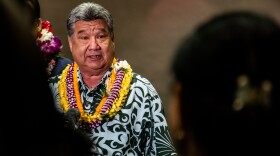The nonprofit Hawai‘i Symphony Orchestra is looking to the state Legislature for a more stable funding source to expand its musical resources statewide.
On Tuesday, the Senate Transportation and Culture and the Arts Committee advanced Senate Bill 441, which would recognize HSO as a state orchestra and grant it $500,000 for the next two years.
The orchestra has a nearly $6 million budget generated by ticket sales and donors.
Amy Iwano, president and CEO of HSO, said the measure would help the orchestra expand free public concerts statewide, enhance music education for thousands of children in the state, support local musicians and cultural collaboration, and commission new works that reflect Hawai‘i’s unique heritage.
“Right now, many communities — especially on the neighbor islands and in underserved areas — have little to no access to live symphonic music,” Iwano said in written testimony. “Music education opportunities are unevenly distributed, despite clear evidence linking expores to the arts with improved academic and social outcomes.”
SB 441 would also require the president and CEO to provide annual reports to the Legislature. The measure gained the majority of its support from musicians.
The state Department of the Attorney General raised concerns about the measure, saying it would be constitutionally problematic and that a preamble explaining its intent should be included in the bill.
History and resilience of the Hawaiʻi Symphony Orchestra
The symphony orchestra was founded in 1900 and supports 85 musicians, often inviting Grammy-nominated musicians as guest artists in its concert series.
But the orchestra — formerly known as the Honolulu Symphony — has endured a series of financial struggles over its first century. It endured two world wars, the Great Depression, and even filed for bankruptcy in 2009.
It was resurrected about 14 years ago and renamed the Hawai‘i Symphony Orchestra. The current musical season features HSO Music Director Dane Lam in the five-concert Beethoven Festival, which began on Feb. 6
The HSO board named Iwano as the new head last year. Iwano replaced Dave Moss, who left the organization in December 2023.
Iwano oversees the orchestra’s finances, artistic programming, fundraising, and strategic planning. Some of her goals are to conduct community outreach and restart orchestra performances statewide.
Contrabassoonist Philip Gottling testified in support of SB 441. He joined the then-called Honolulu Symphony in 1986 and “was deeply impressed by the statewide outreach the orchestra provided at the time."
“We did four tours a year to Hilo, Kona, Maui, and Kaua‘i,” he said. “These regular tours ended in the early '90s, the Honolulu Symphony declared bankruptcy, and the Hawai‘i Symphony arose in its place. I am still a proud member and in my 39th season.”
"Funding is a constant challenge"
Although HSO is in good financial standing, Iwano told HPR that more work needs to be done to increase revenues.
Simon Woods, president and CEO of the League of American Orchestras, said many orchestras look to their state legislatures for financial support, especially when they’re statewide organizations like Hawai‘i's.
He added that orchestras like those in Salt Lake City and Seattle often get support from legislatures through tax-related arts funding.
“Like all arts organizations, funding is a constant challenge. But in general, orchestras are very resilient: even when they do close down, they tend to come back,” he said.
“Examples of that include the San Antonio Symphony resurrected as the San Antonio Philharmonic; Syracuse Symphony (New York), resurrected as Symphoria and then renamed The Syracuse Orchestra, and the Honolulu Symphony, now the Hawai’i Symphony Orchestra.”
Music Director Lam underscored that HSO will still be an autonomous organization if the bill becomes law.
The measure needs to clear the Senate Ways and Means Committee before the full Senate votes.
Editor's note: The Hawaiʻi Symphony Orchestra is an underwriter of Hawaiʻi Public Radio.






